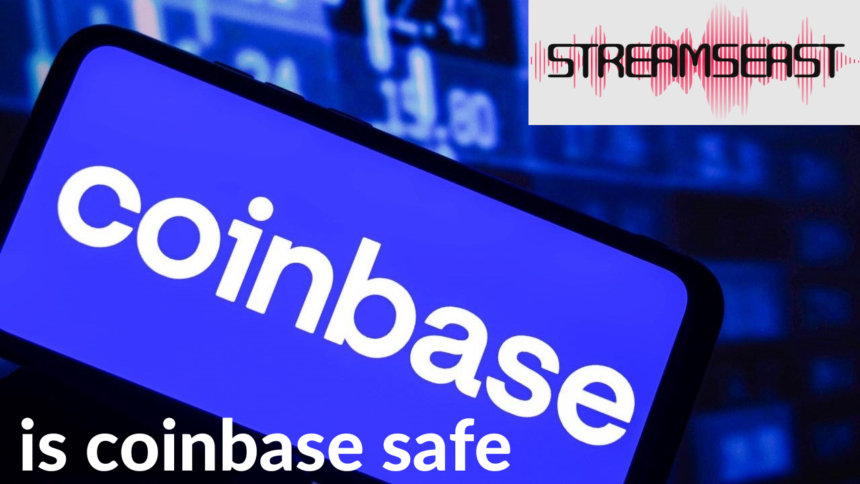In today’s world, many people are turning to cryptocurrency exchanges like Coinbase to buy, sell, and store their digital currencies. But with all the buzz around crypto, one of the biggest questions is: Is Coinbase safe? Whether you’re a seasoned investor or new to the world of crypto, it’s crucial to understand how secure your funds and personal information are. In this article, we’ll take an in-depth look at Coinbase’s security measures, risks, and how you can protect yourself while using the platform.
Is Coinbase Safe to Use in the U.S.?
Coinbase is one of the most popular cryptocurrency exchanges, and many users in the U.S. trust it with their digital assets. But, like any platform that deals with money, it’s natural to have concerns about its safety. is coinbase safe is regulated in the United States and is required to follow strict laws and regulations that help protect users. The platform complies with various financial regulations, such as the Bank Secrecy Act (BSA), which includes measures to prevent money laundering.
Additionally, Coinbase has registered with the U.S. Financial Crimes Enforcement Network (FinCEN) and works with law enforcement agencies when necessary. These measures ensure that it operates under the oversight of U.S. regulators, which adds a layer of security for users. However, despite these protections, it’s important to remember that no platform is entirely risk-free.
How Does Coinbase Keep Your Money Safe?
Coinbase takes several steps to ensure your funds are secure. One of the key ways it keeps your crypto safe is through a combination of hot and cold storage. Cold storage refers to keeping the majority of user funds offline in secure hardware devices, which reduces the risk of online hacks. Only a small portion of funds are kept in hot storage, which is connected to the internet for easy access when you make trades.
In addition to storing your funds securely, Coinbase uses advanced encryption methods to protect your personal and financial information. It also offers two-factor authentication (2FA) for an extra layer of security when logging into your account. This makes it harder for hackers to access your account, as they would need both your password and a second factor (like a code sent to your phone).
What Are the Risks of Using Coinbase?
While Coinbase provides a range of security features, there are still risks involved in using the platform. Like all digital services, it is susceptible to cyberattacks and other vulnerabilities. Let’s take a closer look at the potential risks of using Coinbase.

Can Hackers Access Your Coinbase Account?
No system is immune to cyberattacks, and Coinbase has faced security breaches in the past. However, the platform takes steps to minimize these risks by storing most of its users’ funds in offline storage and encrypting sensitive data. Despite these protections, users must also be vigilant. Hackers could gain access to your Coinbase account if your personal information is compromised or if you fall victim to phishing attacks.
It’s important to use strong, unique passwords and enable two-factor authentication (2FA) to reduce the likelihood of unauthorized access. Remember, your account’s safety is also your responsibility.
Coinbase vs Other Platforms: Is It the Safest?
When comparing Coinbase to other cryptocurrency platforms, it’s clear that Coinbase is one of the more secure options available. It has a track record of using advanced security protocols, and its regulatory compliance in the U.S. sets it apart from many other exchanges. However, no platform is completely immune to risks.
Other platforms may offer similar security features, but Coinbase’s reputation and regulatory adherence give it an edge. It’s essential to evaluate all the platforms you consider and make sure they align with your safety expectations.
Is My Data Secure on Coinbase?
Data security is a major concern for anyone using online platforms, and Coinbase takes steps to protect your personal and financial information. It uses encryption to secure your data during transactions and stores most of it in offline cold storage. However, users should be mindful of phishing scams and suspicious emails. These attacks can trick users into revealing sensitive information, such as login credentials or personal details.
Coinbase also keeps your account activity and transaction history secure. But to ensure your data stays safe, you must practice safe browsing habits and be cautious of links and attachments in unsolicited emails.
Here is a bio table summarizing the key details about Coinbase for quick reference:
| Attribute | Details |
|---|---|
| Platform Name | Coinbase |
| Founded | 2012 |
| Headquarters | San Francisco, California, USA |
| Regulation | Regulated in the United States |
| Main Services | Buy, Sell, Store Cryptocurrency |
| Security Measures | Cold Storage, 2FA, Encryption |
| Insurance | Online storage insured against hacks |
| User Base | Over 100 million verified users |
| Supported Countries | 100+ countries worldwide |
| Mobile App | Available on iOS and Android |
| Customer Support | Email Support, Help Center |
| Main Competitors | Binance, Kraken, Gemini |
| Reputation | Trusted and regulated in the U.S. |
| Best For | Beginner to Experienced Traders |
| Website | www.coinbase.com |
This bio table is a snapshot of Coinbase for easy understanding and quick facts.
Is Coinbase Insured Against Hacks?
One of the biggest concerns for cryptocurrency users is the possibility of hacks. Coinbase offers insurance coverage for digital assets held in its online storage, which can provide some peace of mind in case of a security breach. This insurance policy covers losses that may occur from a breach of Coinbase’s own systems.
However, it’s important to note that the insurance does not cover losses resulting from user error, such as losing access to your account due to a forgotten password. It also doesn’t cover funds stored in offline cold storage, so if a hack were to occur and funds were compromised, the insurance would not apply.
Should You Trust Coinbase with Your Crypto?
So, should you trust Coinbase with your cryptocurrency? In general, Coinbase is considered one of the safer exchanges available. It has a strong reputation in the industry, robust security measures, and regulatory compliance in the U.S. While no platform is entirely risk-free, Coinbase offers several layers of protection, such as cold storage, encryption, and 2FA, that make it a trustworthy option for storing and trading crypto.
Ultimately, the decision to trust Coinbase depends on your level of comfort with its security measures and your understanding of the risks involved. It’s always important to stay informed and use best practices to keep your account safe.
What Happens if Coinbase Gets Hacked?
In the event of a hack, Coinbase has a plan in place to protect users. Since a large portion of funds is stored in cold storage, it’s less likely that a breach would result in significant losses. Additionally, the platform’s insurance coverage can help mitigate losses from breaches that affect online storage.
Coinbase also has a dedicated security team that works around the clock to detect and respond to threats. If a hack does occur, Coinbase will notify affected users and take steps to address the situation. In the worst-case scenario, users may be reimbursed for any stolen funds that are covered under the platform’s insurance policy.

Coinbase Security Features You Should Know
Coinbase offers a range of security features that you should take advantage of to protect your account. Some of the key features include:
- Two-Factor Authentication (2FA): Adds an extra layer of security when logging into your account.
- Cold Storage: Most of your funds are stored offline, reducing the risk of online hacks.
- Encryption: Coinbase encrypts your data to protect it from unauthorized access.
- Secure Wallet: Coinbase’s wallet provides additional protection for your cryptocurrency.
What to Do if You Lose Access to Coinbase
If you lose access to your Coinbase account, don’t panic. Coinbase has a recovery process in place to help you regain access. First, make sure that you have access to the email and phone number associated with your account. Then, you can go through the account recovery process, which may include verifying your identity and resetting your password.
It’s also important to reach out to Coinbase’s support team for assistance if needed.
How Does Coinbase Protect Your Funds?
Coinbase uses a combination of security features to protect your funds. As mentioned earlier, most funds are stored offline in cold storage, making them less vulnerable to hacks. The platform also encrypts your personal information and offers 2FA for added security. Coinbase’s commitment to security ensures that your funds are protected as best as possible, but you also need to take steps to protect your own account.
How to Protect Yourself While Using Coinbase
To protect yourself while using Coinbase, follow these best practices:
- Use a strong, unique password for your account.
- Enable two-factor authentication (2FA) to add an extra layer of security.
- Be cautious of phishing scams and avoid clicking on suspicious links.
- Use cold storage for storing large amounts of cryptocurrency, if possible.
- Keep your device secure with antivirus software and regular updates.
By following these steps, you can significantly reduce the chances of your account being compromised.
The Bottom Line
Coinbase is generally considered a safe platform for buying, selling, and storing cryptocurrency, especially in the United States. It offers robust security features, complies with U.S. regulations, and has a good track record of protecting users. However, like any online platform, there are always risks involved. To keep your account secure, it’s important to use strong passwords, enable two-factor authentication, and stay vigilant against phishing scams. If you take these precautions, Coinbase can be a safe place to store and trade your crypto.








